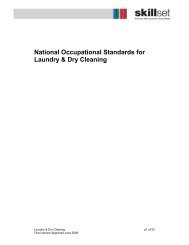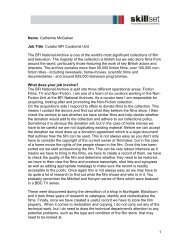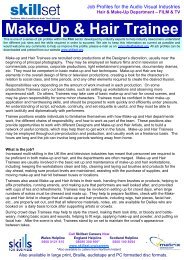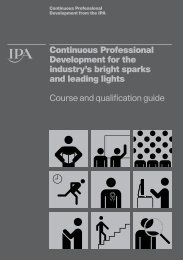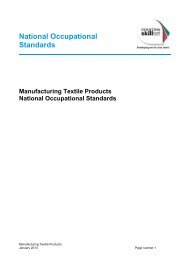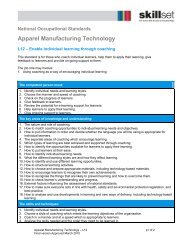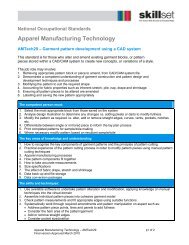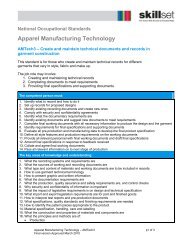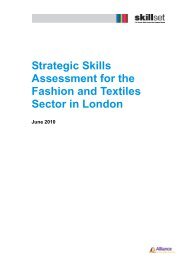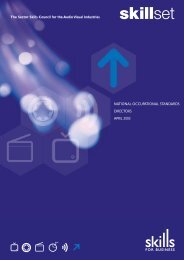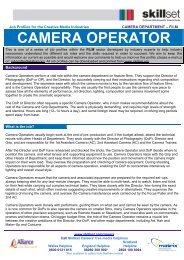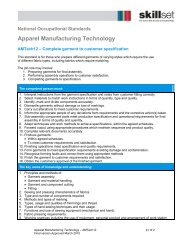CAREER PROFILE CLOTHING ALTERATION HAND - Skillset
CAREER PROFILE CLOTHING ALTERATION HAND - Skillset
CAREER PROFILE CLOTHING ALTERATION HAND - Skillset
Create successful ePaper yourself
Turn your PDF publications into a flip-book with our unique Google optimized e-Paper software.
A laundry maintenance<br />
engineer is responsible for<br />
ensuring machinery and<br />
equipment at the laundry<br />
plant runs efficiently<br />
and smoothly. They must<br />
have expert knowledge<br />
in mechanical, electrical,<br />
hydraulic, pneumatic and<br />
computerised systems.<br />
What does a laundry<br />
maintenance engineer do<br />
Their work revolves around ensuring<br />
machinery for washing and drying<br />
clothes for a commercial laundry is<br />
working efficiently and effectively.<br />
They are also responsible for testing<br />
the water used by washing machines<br />
to make sure it is balanced correctly<br />
for clothes washing.<br />
Senior engineers and managers will<br />
also be involved with administration<br />
work to ensure systems and<br />
procedures are adhered to.<br />
The salary of a laundry<br />
maintenance engineer<br />
A laundry maintenance engineer<br />
could expect to be paid around<br />
£16,000 per year as an apprentice<br />
engineer, with experience this can<br />
rise to £21,000. Supervisors will<br />
earn around £18,000 to £25,000.<br />
Managers could earn up to £30,000<br />
per year or more.<br />
Hours and working environment<br />
Laundry maintenance engineers<br />
usually work around 39 hours a<br />
week. Although weekend work is<br />
not common in a commercial<br />
laundry, you will be required to<br />
be ‘on-call’ occasionally in case<br />
of emergency breakdowns.<br />
Laundry maintenance engineers<br />
working environment is on the plant<br />
floor and will be working closely<br />
with machinery so it can be noisy.<br />
Due to working with water and<br />
steam it can be hot.<br />
Skills and interests<br />
You will need to be multi-skilled<br />
with electrical and mechanical<br />
qualifications and knowledge.<br />
A good understanding of maths<br />
and science is also essential.<br />
* an interest in machinery<br />
and fixing equipment<br />
*<br />
*<br />
to be logical, practical<br />
and adaptable<br />
to be self-motivated to work<br />
alone or as part of a team<br />
* physically fit<br />
Entry into a career in laundry<br />
maintenance engineering<br />
You will need some qualifications<br />
to become an engineer and passes<br />
in maths and science GCSE are a<br />
must. Work-based apprenticeships<br />
are a common route for many<br />
entering engineering. For more<br />
information on apprenticeships,<br />
visit the apprenticeship website:<br />
www.apprenticeships.org.uk.<br />
The Institution of Engineering and<br />
Technology website has details<br />
of UK colleges offering<br />
engineering courses.<br />
Further training to develop<br />
a career in laundry<br />
maintenance engineering<br />
As technology changes and becomes<br />
more efficient, many engineers find<br />
they need to do short courses to keep<br />
their skills and knowledge up to date.<br />
Many businesses will assist with this<br />
element of further training and it will<br />
often be tailored to suit the business<br />
you work for.<br />
Opportunities in the field of a<br />
laundry maintenance engineer<br />
Once you have an engineering<br />
qualification you can move into<br />
many sectors not just laundry and<br />
dry cleaning. There are opportunities<br />
to develop your skills and training<br />
and you can work your way up to<br />
supervisor or managerial levels in<br />
some companies.<br />
Case study<br />
Andy Pitts has worked at<br />
Johnson Apparelmaster<br />
for almost two years<br />
and has recently been<br />
promoted to senior<br />
maintenance engineer at<br />
the commercial laundry<br />
based in Hull.<br />
Andy worked while studying<br />
for his marine engineering<br />
apprenticeship. This led him<br />
to do engineering work in<br />
many areas including boiler<br />
maintenance and laundry.<br />
Andy says “To become a<br />
maintenance engineer you<br />
need to be multi-skilled with<br />
electrical and mechanical<br />
training. You need to be<br />
able to think problems<br />
through logically and have<br />
a good head for numbers.<br />
Being physically fit is also<br />
an advantage.”<br />
Andy’s job is not just about<br />
working with hand tools,<br />
many of the machines are<br />
computerised so expertise<br />
in electronics and electrics<br />
are essential. There is also<br />
a very scientific element<br />
involved to make the water<br />
soft for washing clothes.<br />
Andy says “My work is<br />
really varied as every<br />
problem is different so<br />
it makes it interesting.<br />
Technology is always<br />
changing so I am always<br />
learning something new.”<br />
For more information visit<br />
www.skillfast-uk.org/generationf



